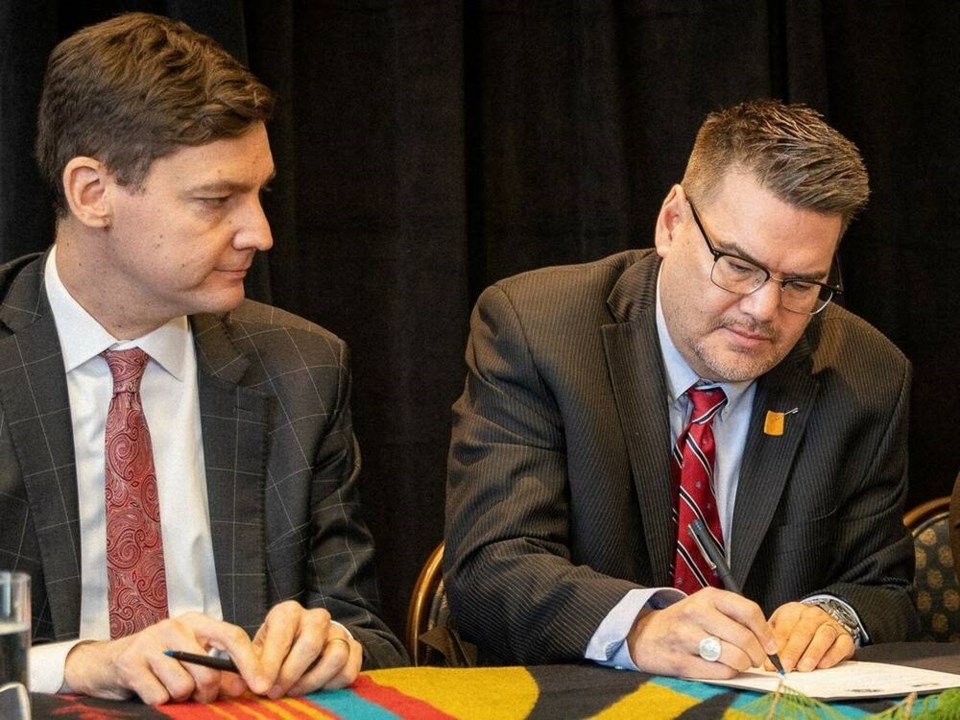Since the B.C. NDP government passed the Declaration on the Rights of Indigenous Peoples Act in 2019, it has been criticized for saying the right things about reconciliation but not following up with action.
“I’ve heard frustration from all sides,” Doug White said. “Nobody likes to be stuck in a performative sort of scenario. We need to collectively figure out the substantive pathway” to make sure the act leads to “on-the-ground changes.”
As special counsel to the premier on Indigenous reconciliation, it’s White’s goal to ensure ministries focus on structural changes that will make life better for Indigenous people.
The new role, he said, “is very much aimed at trying to do work to assist the government to fund different initiatives and projects that may be not getting the attention they need or have fallen through the cracks.”
One of the most pressing “extraordinary crises,” he said, is the over-representation of Indigenous people in the criminal justice system.
As former chair of the First Nations Justice Council, White has long advocated options to divert Indigenous people out of the criminal system when possible, taking into account the person’s cultural background and the root causes of crime, including intergenerational trauma.
Some have said new directives to Crown counsel — which stress that repeat violent offenders should be kept in jail until trial — will disproportionately hurt Indigenous people by keeping them behind bars longer.
Eby disputed that, pointing to the government’s plan to spend $44 million over three years for 10 additional Indigenous justice centres that can provide culturally appropriate supports.
“We’ve dramatically increased our support for those centres because of their success in helping people break that cycle and give them a chance at a life that isn’t part of this rotating door in and out of jail,” Eby said.
White pointed to an Indigenous justice centre pilot project in Prince George where teams are “hyper-focused” on repeat Indigenous offenders. “We’re seeking to connect the individual with the kinds of resources and support they need beyond the scope of the general criminal justice response.”
White’s passion for Indigenous rights and justice was ingrained from a young age.
As a member and eventual chief of the Snuneymuxw First Nation near Nanaimo, White grew up understanding the significance of a 1965 Supreme Court of Canada case that saw Clifford White and David Bob successfully fight a charge of hunting out of season — a landmark case that recognized Douglas Treaty rights.
White, whose grandfather was the Snuneymuxw chief at the time, said this “important story in the life of our nation, knowing the power of the legal system to make a difference,” inspired him to pursue Indigenous leadership roles and a legal career.
White completed law school at the University of Victoria in 2007 and went on to be chief negotiator for the Lake Babine Nation. The father of four was also a member of the First Nations Summit Task Group that speaks on behalf of First Nations involved in treaty negotiations with the B.C. government.
B.C. Green MLA Adam Olsen, a member of the Tsartlip First Nation, said he’s known White for more than a decade.
“I heard of this guy who was a lawyer, a chief and a progressive but also understood the history,” Olsen said. “He comes from a family lineage that has been engaged with the Crown governments over the years.”
Olsen said White faces a herculean task of “unwinding many of the outcomes [for Indigenous people] that have come as a result of the inequality, systemic and institutionalized racism in the provincial government institution.”
This systemic racism is apparent in the under-representation of Indigenous people in positions of power in the justice system, White said, including police officers, Crown prosecutors, judges and probation officers.
“I’ve heard lots of stories from former RCMP [officers] who are Indigenous … that they were not necessarily embraced and welcomed in the way that they should have been.”
White said he wants to see more Indigenous-led police forces. The Stl’atl’imx Tribal Police Service is the only First Nations-administered police service in B.C.
“The system of public safety, it’s unlikely it will ever be what those communities need until it emanates from them and their people,” he said.
Judith Sayers, a director of the B.C. First Nations Justice Council who has worked closely with White over many years, said the expectations are high for White to turn symbolic gestures into action, she said.
It means a lot that the premier wants White by his side, said Sayers, who is president of the Nuu-chah-nulth Tribal Council.
“To me, that’s pretty powerful. It excites me that we can have somebody like Doug in the premier’s office.”
Jody Wilson-Raybould, a former federal justice minister, applauded White’s appointment, seeing first-hand his commitment to Indigenous rights when the two served on the First Nations Leadership Council together.
“We need to see Indigenous peoples around tables that they haven’t been around before,” she said. “What individuals do in those positions makes all the difference — being uncomfortable and pushing hard against the status quo and entrenched realities is how we make change.
“I’m hopeful that Doug and any other Indigenous person that finds themselves in these positions … that they push hard and speak up where some people haven’t spoken up before,” Wilson-Raybould said. “Knowing Doug from way back, I think that he will take advantage of that opportunity.”



